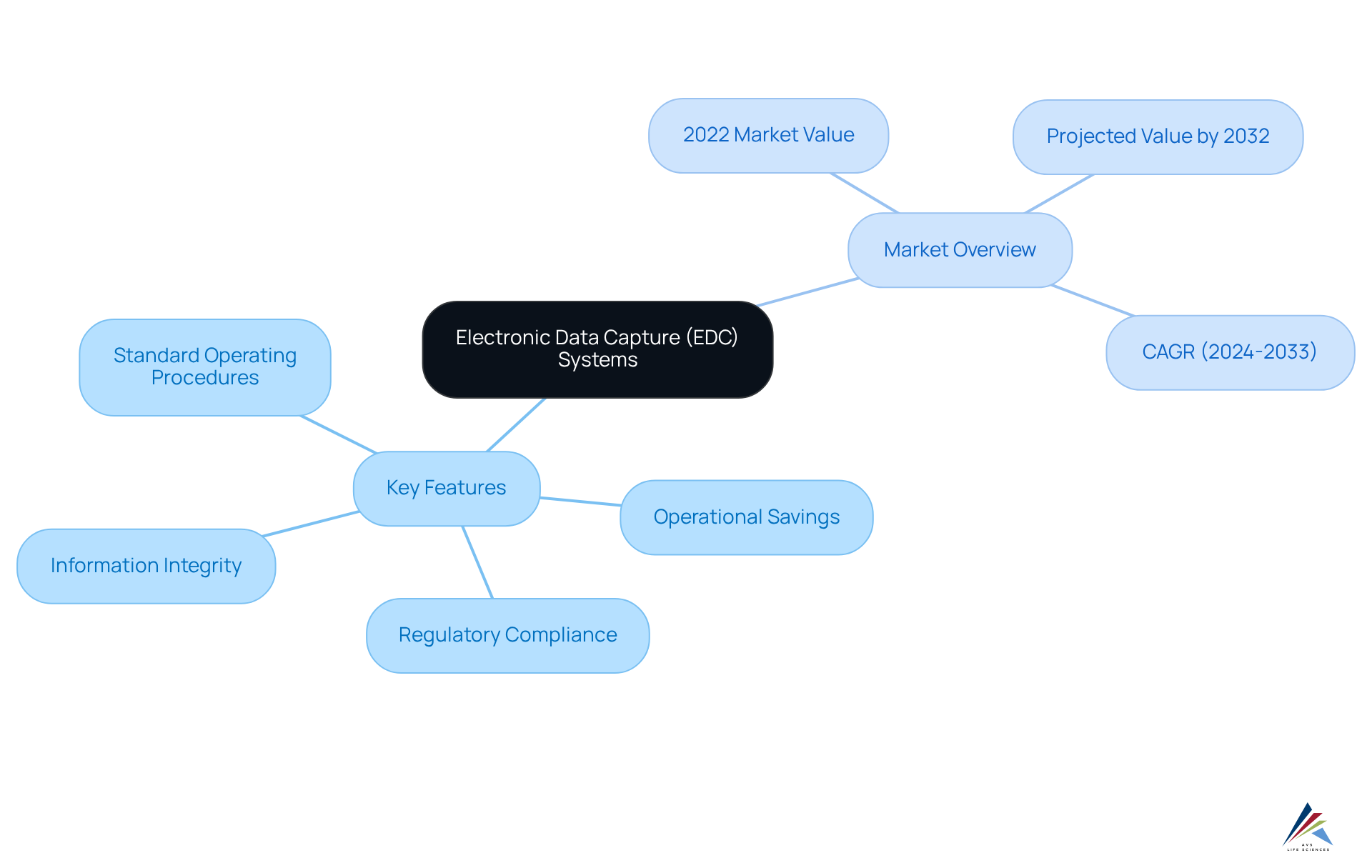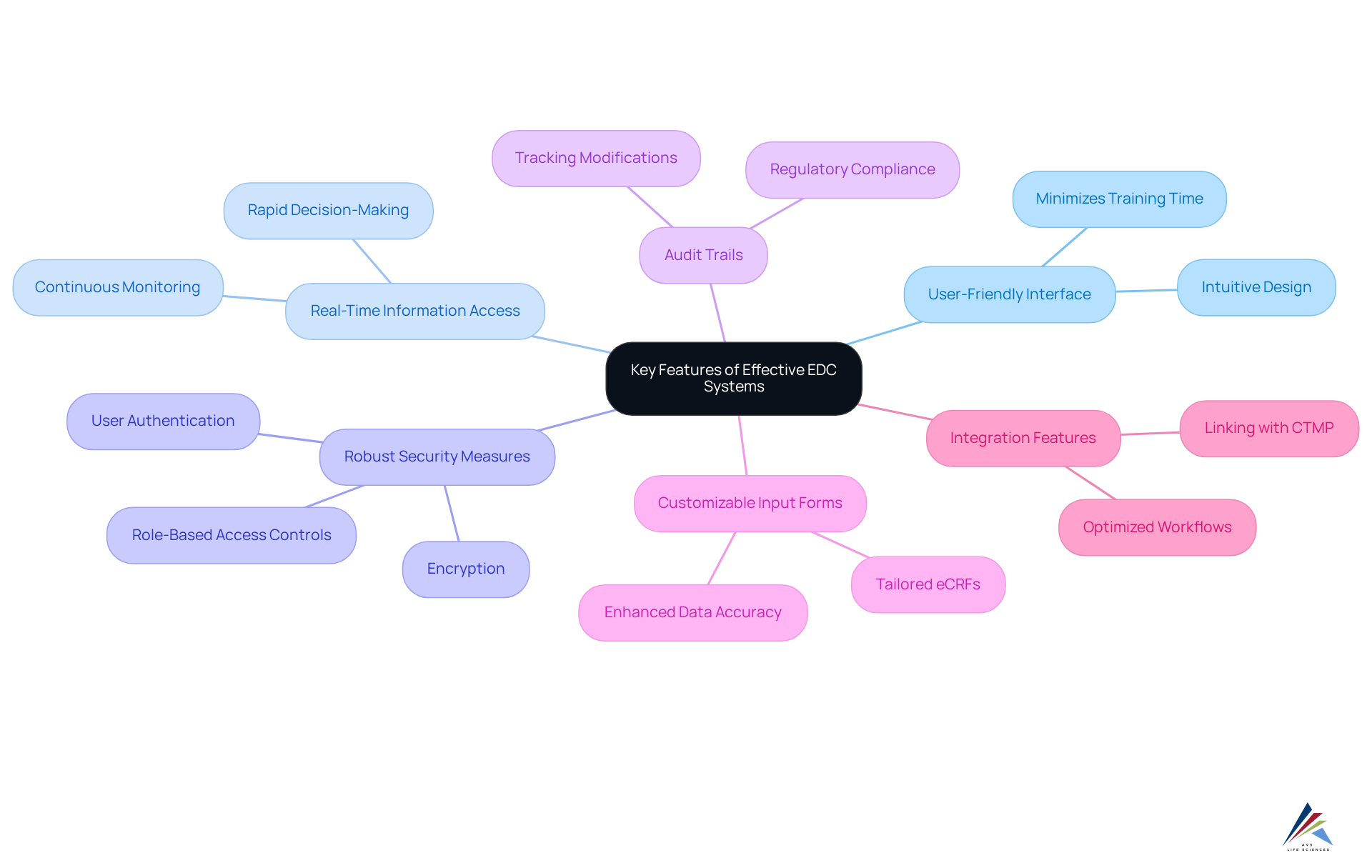Best Practices for EDC Systems in Clinical Trials Compliance

Overview
Best practices for Electronic Data Capture (EDC) systems in clinical trials compliance are critical in today’s regulatory landscape. Ensuring regulatory adherence is paramount, coupled with the implementation of robust security measures and comprehensive training for users. These practices not only enhance data integrity and operational efficiency but also empower organizations to effectively navigate compliance challenges. Ultimately, this strategic approach leads to improved clinical trial outcomes, underscoring the necessity of engaging with proven compliance solutions.
Introduction
The evolution of clinical trials has been significantly shaped by the increasing reliance on Electronic Data Capture (EDC) systems, which revolutionize the methods of data collection, management, and security. These advanced tools not only streamline the research process but also ensure compliance with stringent regulatory standards, providing organizations with substantial operational savings and enhanced data integrity.
However, as the demand for these systems escalates, so too do the challenges associated with data security and regulatory adherence. How can organizations effectively navigate these complexities to harness the full potential of EDC systems while maintaining compliance and safeguarding sensitive information?
Define Electronic Data Capture (EDC) Systems in Clinical Trials
EDC systems for clinical trials are advanced computerized instruments that significantly enhance the gathering, management, and storage of trial information in a digital format. These systems facilitate effective information collection from various sources, including medical locations and patient interactions, ensuring that the details are precise, secure, and readily available. By replacing conventional paper-based methods, EDC systems for clinical trials greatly enhance the information gathering process and elevate the overall quality of research trials.
Key Features of EDC Systems:
- [Regulatory Compliance](https://bioaccessla.com/blog/10-benefits-of-electronic-data-capture-for-clinical-research): EDC systems assist researchers in maintaining compliance with regulatory requirements, such as Good Clinical Practice (GCP) and FDA regulations, which emphasize the integrity and security of clinical data.
- Operational Savings: Organizations implementing EDC systems for clinical trials can achieve operational savings of up to 62% compared to conventional methods, highlighting the financial benefits along with compliance and quality improvements.
- [Information Integrity](https://pmc.ncbi.nlm.nih.gov/articles/PMC6170092): EDC systems for clinical trials promote adherence to GXP standards, ensuring that information integrity is preserved throughout the trial process.
- Standard Operating Procedures (SOPs): The implementation of EDC frameworks frequently includes the development of SOPs to guide information management practices.
In 2022, the global EDC market was valued at approximately USD 1.7 billion and is projected to reach USD 4.7 billion by 2032, driven by the increasing demand for effective information management in clinical research. The expected compound annual growth rate (CAGR) for electronic information capture technologies is estimated at 15.8% from 2024 to 2033, highlighting the growing importance of EDC systems for clinical trials within the industry. However, challenges related to information privacy and regulatory compliance remain significant in the EDC marketplace, necessitating thorough evaluation by organizations.
Statements from industry leaders underscore the for clinical trials in enhancing trial efficiency and ensuring data integrity, which aligns with AVS Life Sciences' commitment to assisting clients in navigating these challenges.

Identify Key Features of Effective EDC Systems
To optimize clinical trial management, effective must incorporate several essential features.
- User-Friendly Interface: An intuitive design is crucial, allowing users to navigate the system effortlessly, which minimizes training time and reduces the likelihood of errors.
- Real-Time Information Access: Instant access to information is critical for enabling rapid decision-making and continuous monitoring, ensuring that stakeholders can react quickly to arising issues. As emphasized, "Real-time information access is no longer a luxury; it’s a necessity for remaining compliant, responsive, and competitive in today’s clinical trial environment."
- Robust Security Measures: Implementing stringent security protocols, including encryption, user authentication, and role-based access controls, is essential for safeguarding sensitive information against breaches.
- Audit Trails: Comprehensive tracking of information modifications and user activities is necessary to maintain accountability and ensure compliance with regulatory standards, particularly under GXP and FDA regulations.
- Customizable Input Forms: The flexibility to create electronic Case Report Forms (eCRFs) tailored to specific study requirements enhances information collection accuracy and relevance, aligning with best practices in documentation and standard operating procedures (SOPs).
- Integration Features: EDC platforms should effortlessly link with other tools, such as Clinical Trial Management Platforms (CTMP), to optimize workflows and enable effective information sharing.
These attributes collectively enhance the functionality of EDC systems for clinical trials, ensuring they meet the stringent requirements of trials while promoting compliance and operational efficiency. A thorough comprehension of the computer validation procedure, encompassing phases such as Installation Qualification (IQ), Operational Qualification (OQ), and Performance Qualification (PQ), is crucial for guaranteeing that EDC platforms are compliant and efficient in handling research information. Furthermore, adherence to SOPs and excellent documentation practices is essential for preserving the integrity and quality of information throughout the clinical trial process.

Ensure Data Security and Validation in EDC Implementation
To ensure robust data security and validation during the implementation of Electronic Data Capture (EDC) systems, organizations must adopt best practices that address compliance challenges effectively:
- Conduct Risk Assessments: Regularly identify potential vulnerabilities within the EDC system and implement strategies to mitigate these risks. This proactive approach is crucial, as recent statistics indicate that 58% of healthcare breaches originate from third-party vendors, underscoring the necessity for comprehensive evaluations.
- Implement Strong Encryption: Utilize advanced encryption protocols for information both at rest and in transit. This is vital for protecting sensitive patient information from unauthorized access, especially considering that a complete medical record can fetch up to $1,000 on the dark web.
- Establish Multi-Factor Authentication: Require multiple forms of verification for users accessing the EDC platform. This measure significantly enhances security, as hacking and IT incidents account for nearly 80% of all healthcare data breaches.
- Regular Security Audits: Conduct periodic audits to evaluate the effectiveness of security measures and ensure compliance with regulatory requirements. The average breach lifecycle in healthcare spans 279 days, highlighting the importance of timely audits to identify and address vulnerabilities.
- Validation Protocols: Develop and execute to ensure that the EDC platform operates as intended and adheres to all regulatory standards, including 21 CFR Part 11. This involves a multi-step Computer System Validation (CSV) process, which includes planning, defining User Requirement Specifications (URS), design specifications, installation qualification (IQ), operational qualification (OQ), and performance qualification (PQ) testing. Each stage must be documented thoroughly to provide evidence of compliance and system readiness.
- Training and Awareness: Offer comprehensive instruction for all users on information security practices and the significance of preserving information integrity. Continuous education is essential, as only 47% of healthcare facilities reported that their ransom payments were covered by cybersecurity insurance, indicating a gap in preparedness.
By implementing these best practices, organizations can effectively safeguard their data and ensure compliance with regulatory standards. This commitment ultimately enhances the credibility and reliability of their clinical trials.

Implement Best Practices for Transitioning to EDC Systems
To facilitate a successful transition to Electronic Data Capture (EDC) systems, organizations must adopt the following best practices:
- Define Clear Objectives: Establish specific goals for the EDC implementation, including timelines, budget, and expected outcomes. This clarity aligns the project with organizational priorities and ensures accountability.
- Choose the Appropriate EDC Solution: Assess different EDC solutions based on features, usability, and compliance capabilities. An appropriately designed framework significantly improves information handling and adherence to regulations, ultimately enhancing trial results. For instance, trials employing electronic information gathering techniques have shown reduced error rates compared to those relying on paper-based methods, underscoring the importance of selecting an efficient EDC approach.
- Engage Stakeholders Early: Involve key stakeholders, including clinical staff and data managers, in the planning process. Timely engagement fosters teamwork and ensures that the framework meets the diverse needs of all users, which is critical for effective adoption. As Edwin Korver emphasizes, strategy is pivotal in driving an organization's current mission, making stakeholder involvement essential.
- Pilot Testing: Conduct pilot tests of the EDC platform with a small group of users to identify potential issues and gather feedback. This step enables organizations to refine the framework before full-scale execution, minimizing disruptions. The average source-to-database error rate of 14.3 errors per 10,000 fields observed in trials highlights the necessity for thorough testing to ensure data integrity.
- Provide Comprehensive Training: Offer extensive training sessions for all users to familiarize them with the EDC platform and its functionalities. Effective training correlates with improved user satisfaction and operational efficiency, as evidenced by a reported 30% improvement in information precision following comprehensive training initiatives. Addressing common pitfalls, such as high initial costs and extensive training requirements, is crucial for optimizing EDC frameworks.
- Monitor and Evaluate: After implementation, continuously observe performance and gather user feedback. Regular assessments help identify areas for enhancement and ensure that the EDC framework evolves with the organization’s needs. The incorporation of robust reporting tools in EDC platforms aids this continuous evaluation process.
By adhering to these best practices, organizations can ensure a smooth transition to EDC systems, enhancing their clinical trial processes and data management capabilities. Successful implementations have demonstrated that a structured approach not only improves compliance but also leads to better patient outcomes and operational efficiencies.

Conclusion
The implementation of Electronic Data Capture (EDC) systems in clinical trials signifies a transformative shift in data collection, management, and analysis. By leveraging advanced technology, these systems streamline the data gathering process and enhance compliance with regulatory standards, leading to more reliable and efficient clinical trials.
Key features of effective EDC systems include:
- User-friendly interfaces
- Robust security measures
- Real-time information access
- Customizable input forms
These attributes are essential for ensuring data integrity and operational efficiency. Best practices for transitioning to EDC systems emphasize:
- Clear objectives
- Stakeholder engagement
- Thorough training
Furthermore, addressing data security and validation through comprehensive risk assessments and strong encryption protocols is critical for maintaining compliance and protecting sensitive information.
In light of the growing significance of EDC systems in clinical research, organizations are urged to embrace these best practices. This not only enhances operational capabilities but also ensures the integrity and quality of clinical trials. As the landscape of clinical research evolves, adopting effective EDC systems will be paramount in driving successful outcomes and fostering advancements in healthcare.
Frequently Asked Questions
What are Electronic Data Capture (EDC) systems in clinical trials?
EDC systems are advanced computerized instruments that enhance the gathering, management, and storage of trial information in a digital format, replacing conventional paper-based methods to improve the quality of research trials.
What are the key features of EDC systems?
Key features include regulatory compliance, operational savings, information integrity, and the development of Standard Operating Procedures (SOPs) for information management practices.
How do EDC systems assist with regulatory compliance?
EDC systems help researchers maintain compliance with regulatory requirements such as Good Clinical Practice (GCP) and FDA regulations, which emphasize the integrity and security of clinical data.
What are the financial benefits of implementing EDC systems?
Organizations can achieve operational savings of up to 62% compared to conventional methods, highlighting both financial benefits and improvements in compliance and quality.
What is the current market value and growth projection for EDC systems?
In 2022, the global EDC market was valued at approximately USD 1.7 billion and is projected to reach USD 4.7 billion by 2032, with a compound annual growth rate (CAGR) of 15.8% from 2024 to 2033.
What challenges exist in the EDC marketplace?
Significant challenges include concerns related to information privacy and regulatory compliance, which organizations need to evaluate thoroughly.
What is the importance of EDC systems according to industry leaders?
Industry leaders emphasize that EDC systems enhance trial efficiency and ensure data integrity, which is critical for the success of clinical trials.
